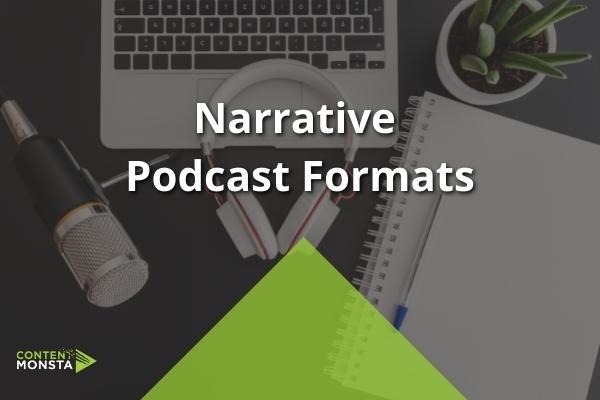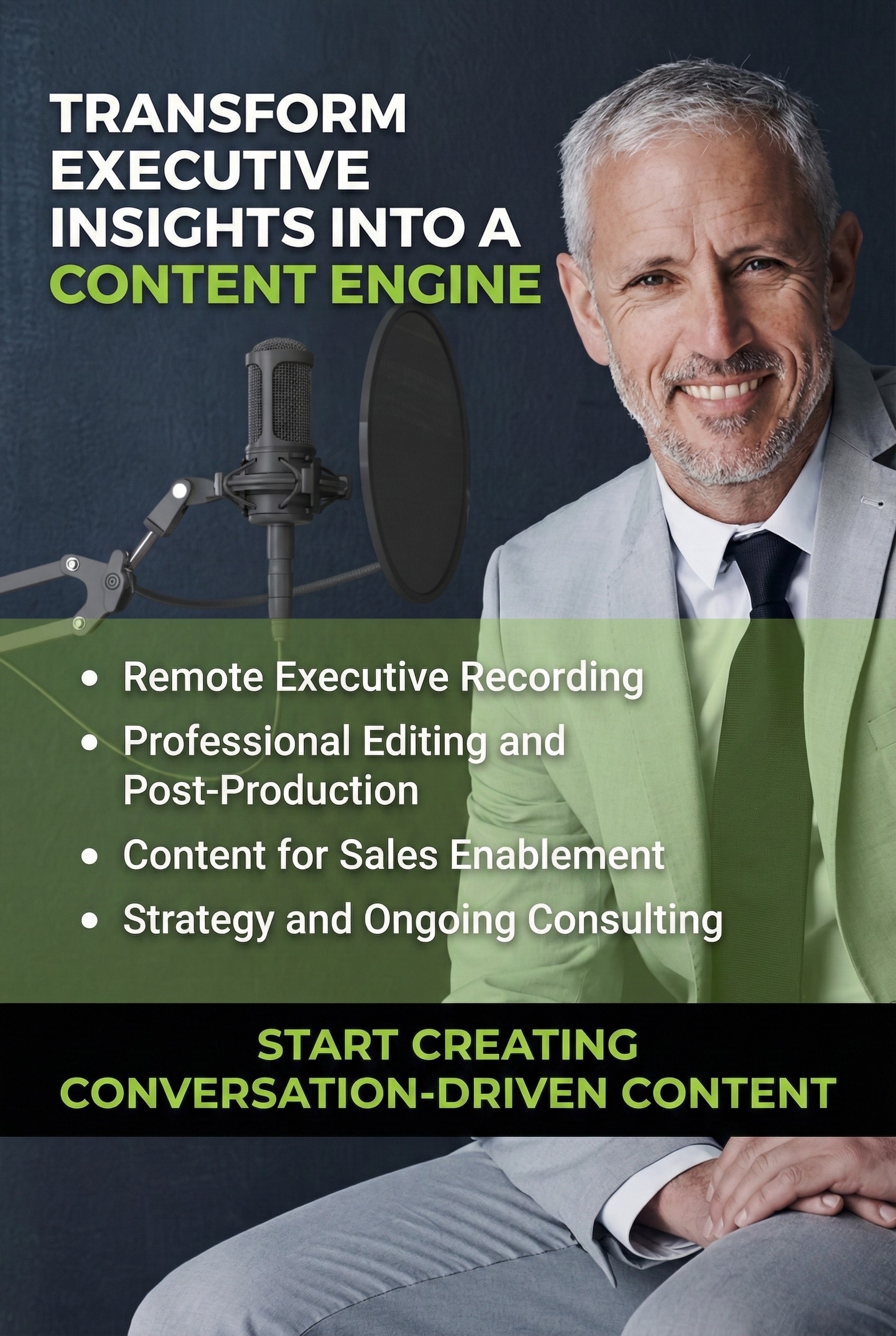As the landscape for podcasting matures, complex show formats such as narrative podcasts for business have evolved. Narrative podcasts have always existed, especially for fiction or documentary shows, however interview and conversational podcasts have traditionally been what you will find for more business oriented shows, until now.
Narrative podcasts take more planning and intention than a regular interview. So let’s take a closer look at what distinguishes a narrative podcast from other formats, as well as what goes into creating a narrative podcast episode that tells the most engaging tale possible.
What Is a Podcast Format?
Podcast formats are techniques to organize the content of your show so that it has a logical framework. Choosing the appropriate format can help you arrange your material and make it more accessible to your audience.
Your listeners will appreciate the consistency that a podcast format provides. Your listeners will know what to expect from each episode if you choose and stick to a format.
A good format also makes it easier for your listeners to tell their friends about your show, and word-of-mouth marketing is crucial to a show’s success.
What Is a Narrative Podcast?
We will cover other types of podcasts later, but for now, let’s look at the growing format of Narrative Podcasts. A narrative podcast is an audio documentary that follows a story arc and is guided by a host or storyteller.
Rather than a full interview, the program uses scripted parts and pre-recorded segments to tell the story, often in a non-linear fashion. They rely more heavily on planning, scripting, and editing, as well as guidance by an ever-present voice, the host.
The purpose of narrative podcasts is to teach listeners by presenting concepts as an immersive experience. They can be fictitious or non-fictional.
The talent of storytelling helps listeners to become a part of what they are learning.
Ann S. Michaelsen said it best, “the true power of narrative podcasts lies in the effect that storytelling has on retention. Stories are the foundation of how we understand and remember information. They do this by triggering our emotions and tying information to the way we feel when we learn something new. By intertwining content with a story, learners are better equipped to recall information by recalling the way they felt when they learned the information.”
Shows produced by NPR are usually the gold standard in this genre of storytelling. Narrative podcasts are an effective method to engage an audience because the emphasis is on storytelling and production quality rather than pontificating. This is evident by the popularity of these shows.
Here Are Four Popular Podcast Formats for Narrative Podcasts
To give our clients a framework to plan their podcasts within, Content Monsta has developed four main types of Narrative Podcast Formats. These are the starting points for planning a podcast and allow the podcaster to keep a consistent format for all of their future shows.
1. Host and Guest Conversation:
The host has a natural conversation with the guest. Usually, one long take of a true conversation guided by planned or scripted questions.
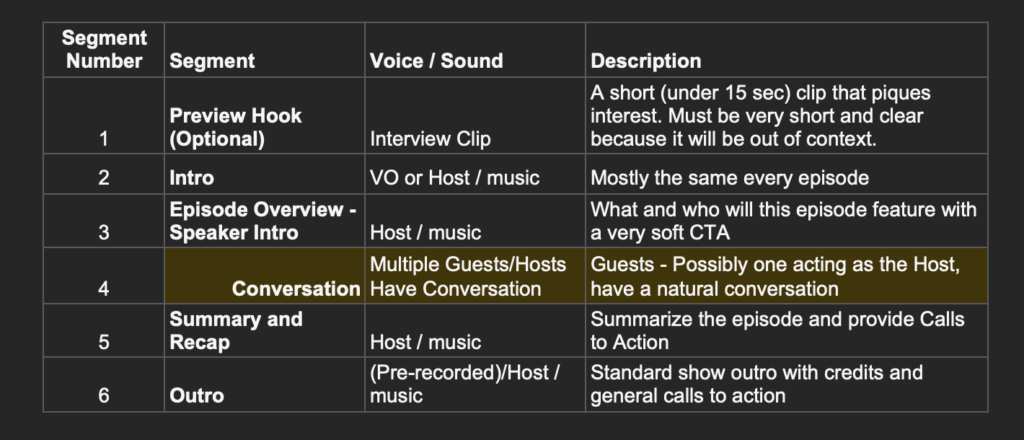
2. Host Narration and Questions Edited In During Post Production:
Questions are preformatted and recorded without the host. Answers are clearly marked in a script so that the host voice or narrator can be edited in later by the podcast producer.
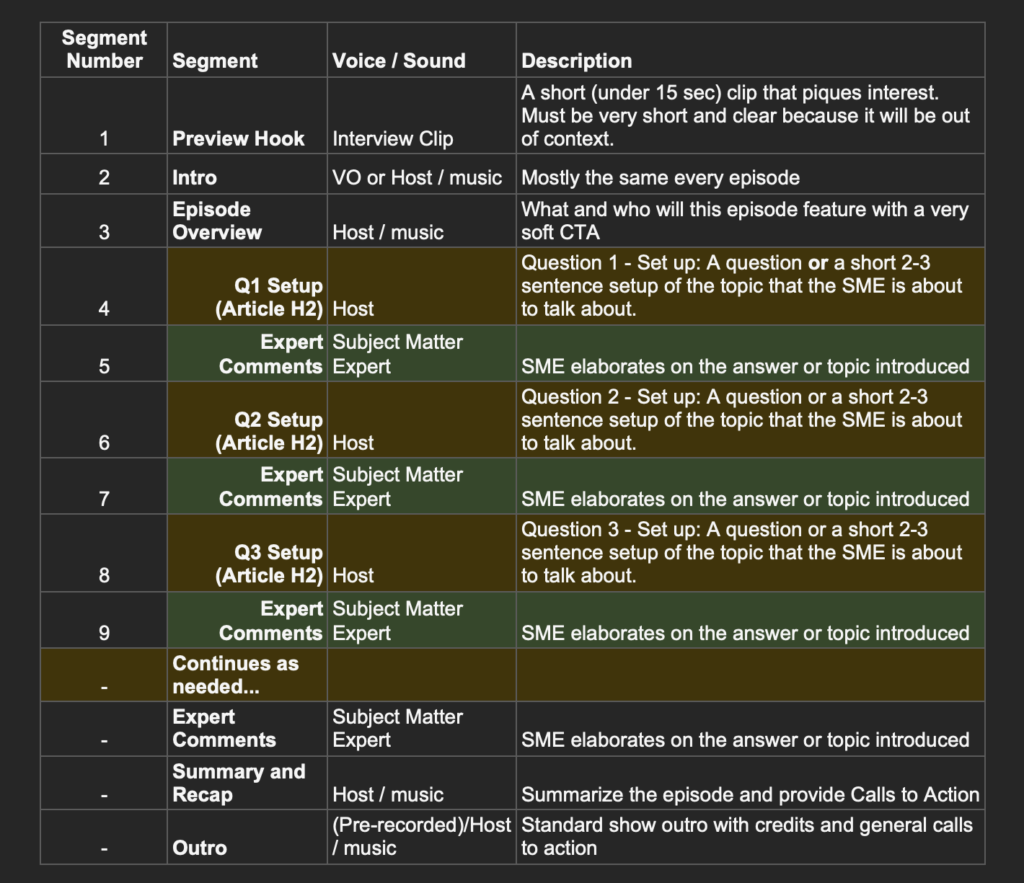
3. Narrated Story Plus Clips from Subject Matter Experts:
The story is told, then the host is edited in as a guide to the full story. This can also be used to edit a long story down or add clear steps.
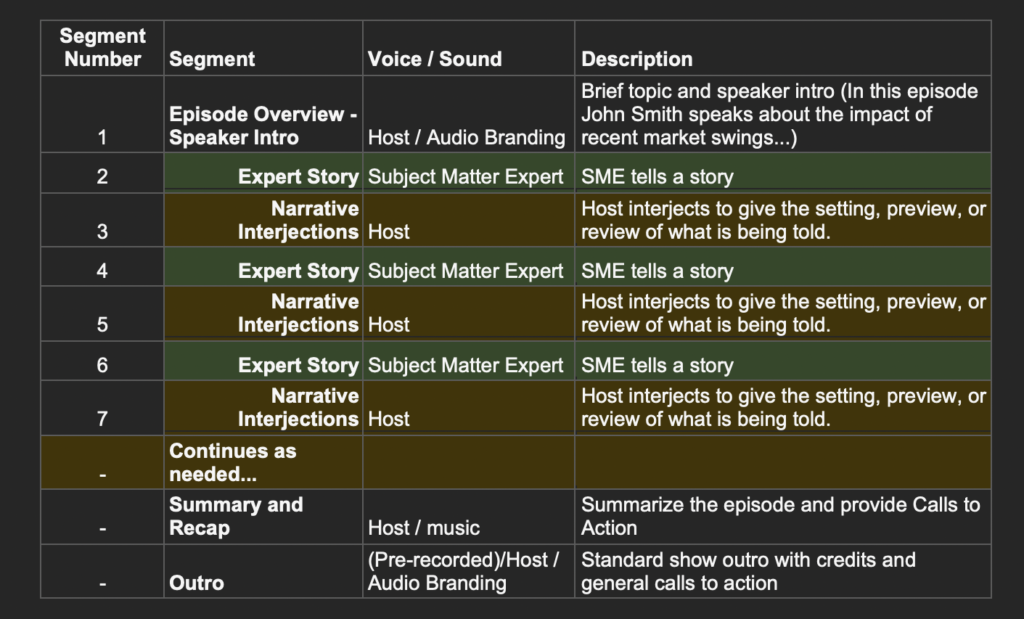
4. Subject Matter Expert Solo Podcast with No Host:
Easily capture a thought leader’s response to an unheard host. Company audio-branding and segue sounds serve as “B-Roll” audio to transition thoughts.
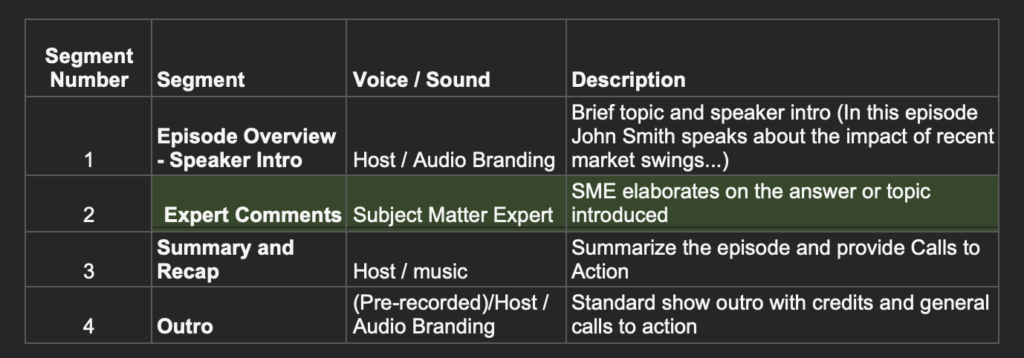
Here Are Five Other Podcast Formats That You Might Consider
Interview Podcasts
The most popular podcast format is undoubtedly interviews. In an interview format, a host (or hosts) interviews a different guest each week who offers their knowledge and experience. While the guests and themes may change, there is always a common thread that runs through them all.
Pros
- Minimal editing will be required as the dialogue progresses.
- Each speaker will contribute their own unique take on your specialty or genre, so you’ll never run out of things to discuss.
- Your program will have access to a wide range of ideas and opinions, which will spark conversation and provide value to your listeners.
Cons
- You’ll need to work with a podcast company or platform that can facilitate connection of remote guests
- There are already a plethora of interview podcasts available. To make yours stand out, you’ll need to come up with a distinctive twist or specialization.
- You must conduct extensive study on your guests.
Educational Podcasts
Educational podcasts are similar to interview or conversational podcasts, except they concentrate on teaching about a specific topic. Detailed show notes are a must for these types of podcasts in order to consolidate learnings and provide links to other resources.
Pros
- Your viewers will return for more if you provide them with valuable content.
- To engage your audience on numerous levels, you can provide supplemental content such as PDF downloads, films, or even whole courses.
Cons
- Without supporting images, some topics might be difficult to teach. You can send listeners to your website for show notes, but the lesson should be simple enough to understand solely through audio.
Solo Podcasts
The solo podcast format is fairly prevalent, and it is typically utilized by persons who wish to convey a specific type of expertise. Because you don’t require a co-host or contacts with guests, solo podcasting is a simple way to get started. You only need a concept, some basic recording equipment, and a free hosting platform to get started.
Pros
- Because you’re the only podcast host and star of the show, you’ll develop a close personal relationship with your listeners.
- Have the last say in what content is included.
- Minimal equipment or software/platform requirements
- Editing can be easier because you are the only voice
Cons
- You will have to record, edit, and publish the show on your own (unless you have a production partner behind the scenes).
- You rely on your own popularity to promote the show
- The show depends on your personality and ability to engage listeners
Conversational Podcasts
Another popular podcast format is conversational. It entails two hosts having a straightforward dialogue and having good chemistry with one another. It has the sense of a friendly conversation between friends and is the favored format for a rising number of celebrities.
Pros
- You have the flexibility to change hosts and guests to keep the show fresh
- Only half of the conversation is your responsibility. You might also divide all of the other responsibilities that come with creating and advertising a podcast.
- Fans feel like they’re a member of a club or group, especially when the hosts create a fun, welcoming atmosphere.
Cons
- You’ll need to get inventive and detailed with the issues you address if you want to keep your audience captivated and returning for more.
- Unless you have a production partner company, you may have to record individually and edit the tracks together, depending on where your co-host is situated.
Non-fictional Storytelling Podcasts
Don’t know where to start each week with a fresh topic? You may make a podcast about a case study, factual story, or industry news. Podcast episodes about true occurrences are known as non-fictional stories.
Listeners who want to learn more about our world will enjoy this podcast format. You have the chance to introduce fresh ideas, concepts, and events to your audience.
Pros
- You can utilize business case studies as stories or share your businesses’ experience
- You don’t have to come up with all of the topics or specifics because your material can come from outside occurrences.
- Taking existing material, such as court cases and mysteries, and stretching it out over intriguing episodes keeps listeners interested in hearing more.
- Other audio sources, such as news broadcasts, movie snippets, or environmental sounds, can be spliced in to improve the experience.
Cons
- Because some episodes take longer to make than others, it’s difficult to maintain a consistent release schedule.
- You must have a thorough understanding of the subject at hand. Listeners are reluctant to overlook inaccuracies.
- Because additional planning and research work is necessary, these aren’t the types of podcasts where you can simply push record and talk into the microphone.
The Wrap
It is undeniably more difficult to produce narrative podcasts than it is to record an interview. As marketers, however, we have a choice: we can either create “yet another” talking head, interview-based show, or we can learn the hidden craft of producing outstanding shows.
The most crucial thing to remember is that the script is the most vital aspect of any narrative podcast. Concentrate on finding a good narrative to tell, then develop a script and record it.
There’s a reason why successful podcasts are successful; you need to figure out what works best in the industry and consider how you might apply comparable strategies to your own. All you have to do now is get started!
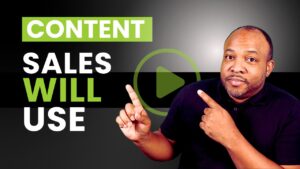
How the READY Framework Turns Content Into Sales Enablement That Drives Revenue
If you’ve ever created polished marketing content and watched it fall flat with your sales team, you are not alone. Too often, content gets approved, it looks great, maybe it

The SAUCE Framework For Better Content Marketing
My niece has been one to keep a hot sauce bottle in her purse long before Beyoncé mentioned it. She doesn’t settle for mediocre flavor and has a backup to
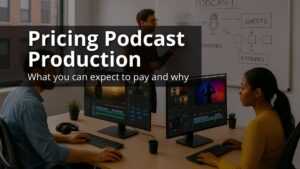
How Much Does it Cost to Hire a Podcast Production Company?
A quick breakdown of what it should cost to hire a podcast production company to help you with your podcast production and promotion.

